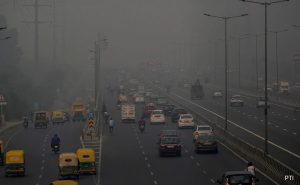Air quality concerns in Kashmir
News Kashmir Analysis
Clean air entails healthy body.
Breathing clean air can lessen the possibility of disease from stroke, heart disease, lung cancer as well as chronic and acute respiratory illnesses such as asthma. Lower levels of air pollution are better for heart and respiratory health both long- and short-term.
As a matter of fact, An air quality index (AQI) is an indicator developed by government agencies to communicate to the public how polluted the air currently is or how polluted it is forecast to become.
According to a study, the air quality recorded for Srinagar city in the Kashmir valley, which is relatively surrounded by pollution-free environment, was found to start declining from the month of October.
This year, According to IQ Air, a real-time air quality information platform, the PM2.5 concentration in Srinagar’s air on January 9 was 28.2 µg/m³, which is 5.6 times over the World Health Organisation’s air quality values. The Air Quality Index was 83 at moderate level. On January 7, the PM 2.5 level reached an alarming 64.2 µg/m³ while the Air Quality Index in Srinagar touched 155 which is considered unhealthy. On an average, Kashmir has been witnessing moderate to high to moderate PM 2.5 and AQI levels with
onset of winter.
As a matter of fact, few time back
On world stroke day, Doctors Association Kashmir (DAK) has said exposure to air pollution increases the risk of stroke.
“Poor air quality heightens your chances of getting a stroke,” said DAK President Dr Nisar ul Hassan.
Dr Hassan said according to a new study published in Journal Neurology short exposure of just 5 days to air pollutants could increase a person’s risk of stroke.
Previous studies have established a link between long term exposure to air pollution and increased risk of stroke.
The expert pulse is On average person inhales around 14,000 litres of air every day. When the air we breathe is of poor quality it can affect our health.
Particulate matter (PM) is a collective term for solid and liquid particles suspended in the air and small enough to be inhaled. PM varies greatly in structure and chemical composition depending on where it comes from. PM comes from human activities and natural sources. It is often classified according to its size because size determines how PM interacts with the environment and human body.
One hopes air quality in Kashmir improves in coming times.




